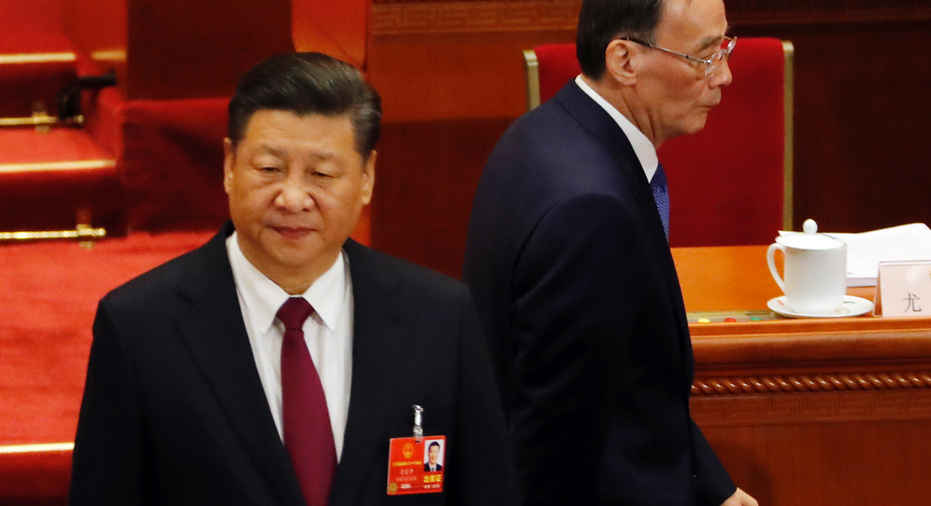China pledges strong growth as Xi bids to rule indefinitely

BEIJING – China's government pledged Monday to deliver robust growth, pursue advanced technology and boost military spending while urging the public to embrace President Xi Jinping's rule as its ceremonial legislature prepared for changes to allow Xi to stay in power indefinitely.
The plan to end constitutional limits on Xi's term as president has overshadowed the meeting of the National People's Congress, which usually is used to showcase economic initiatives and plans for social programs and other government work.
In a nearly two-hour speech to the legislature, Premier Li Keqiang did not mention the scrapping of term limits but emphasized the primacy of Xi and the ruling Communist Party he leads in all aspects of Chinese life.
"Resolutely safeguard General Secretary Xi Jinping's core status and the authority of the party's central committee and its centralized and unified leadership," Li said in a speech to nearly 3,000 delegates to the ceremonial legislature in the Great Hall of the People.
The slide toward one-man rule under Xi, already China's most dominant figure of recent decades, has fueled concern that Beijing is eroding efforts to guard against the excesses of autocratic leadership and make economic regulation more stable and predictable.
The president's office has few powers, but Xi's posts as ruling party general secretary and chairman of the commission that controls the party's military wing, the People's Liberation Army, already have no term limit. By tradition since the early 1990s, one person has held all three posts at the same time.
"If it gets approved, you can describe his attempt to abolish term limits as really to make China medieval again, not to make China great again," said Warren Sun, a historian of the Chinese Communist Party at Australia's Monash University.
The 64-year-old Xi has appointed himself to head bodies that oversee national security, finance, economic reform and other functions, effectively sidelining Li, the party's No. 2 figure.
Chinese officials have defended the end of Xi's term limits as necessary to ensure continuity as Beijing undertakes a sprawling long-range agenda aimed at making state industry competitive and productive, developing profitable high-tech industry, reducing poverty and cleaning up China's battered environment.
In line with this agenda, Li set this year's growth target at around 6.5 percent, which would be among the world's strongest if achieved.
It comes amid a marathon campaign to nurture self-sustaining growth based on domestic consumption instead of trade and investment and to rein in surging debt that prompted ratings agencies to cut Beijing's government credit rating last year.
Li said the target would enable China to achieve "relatively full employment."
Private sector analysts have questioned whether Beijing can achieve such strong growth without infusions of bank lending and government spending, which would set back its reforms.
Last year's growth came in at 6.9 percent, but that was supported by a boom in bank lending and real estate sales that regulators are trying to rein in amid concern about debt that has soared to the equivalent of 270 percent of annual economic output — unusually high for a developing country.
Li promised progress on an array of politically challenging plans, including the restructuring or bankruptcy of "zombie enterprises," money-losing but politically favored companies that are kept afloat by loans from government banks.
The premier said Beijing will speed up state-led development of integrated circuits, mobile communications, aircraft engines, electric cars and other technology.
China's military spending, already the world's second-highest behind the United States, will rise 8.1 percent to 1.1 trillion yuan ($173 billion) as Beijing prepares to launch its second aircraft carrier and develop stealth fighters and advanced missiles.
"We will stick to the Chinese path in strengthening our armed forces, advance all aspects of military training and war preparedness," Li said. He said the military would "firmly and resolvedly safeguard national sovereignty, security and development interests."
The move to consolidate even more power under Xi comes as foreign governments, already wary of China's expanding influence abroad, are closely watching shifts toward greater authoritarianism.
Chinese investments abroad in technology and banking are under closer scrutiny, while foreign companies and governments complain that Beijing hampers access to its markets in violation of its free-trade commitments.
Xi's ambitious "Belt and Road" initiative to link up Asia and Europe by building roads, ports and other infrastructure has raised concerns about Beijing's strategic ambitions and debt burdens for host countries.
The move has been met with widespread concern among liberal intellectuals and political observers. Members of the ceremonial legislature, unsurprisingly, expressed support for the scrapping of term limits.
"This is conducive to the continuation of the management of our country," said delegate Li Xiuxiang, a professor at the Jiangxi University of Finance and Economics. "It can keep the system stable over the long term and lay a good foundation for the system's gradual reform."
Legislators also are due to endorse the appointment of economic and other officials picked by the party. That is widely expected to include the promotion of Xi's top economic adviser to a post overseeing reform.
___
Associated Press writer Christopher Bodeen and researchers Fu Ting and Yu Bing contributed to this report.



















